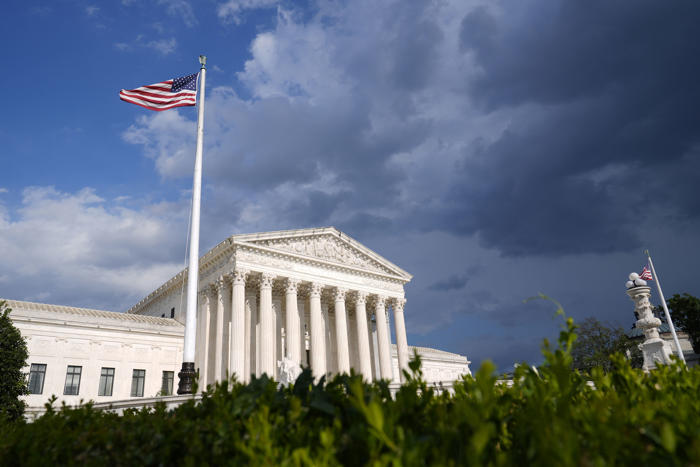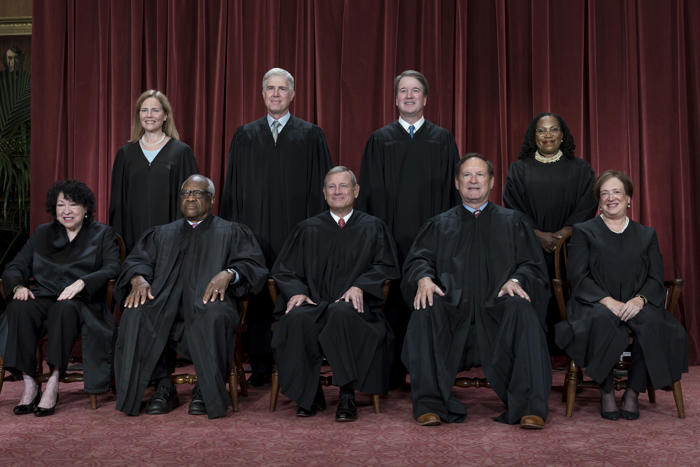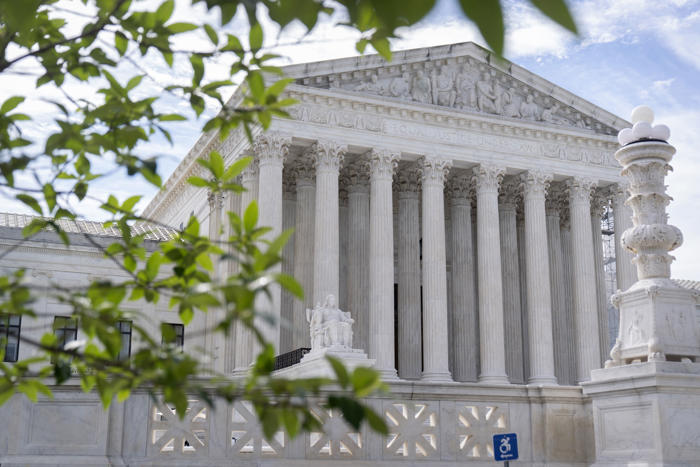US Supreme Court Latest: Court sends Trump’s immunity case back to lower court

The Supreme Court in Washington, Sunday, June 30, 2024. (AP Photo/Susan Walsh)
WASHINGTON (AP) — The Supreme Court extended the delay in the criminal case against Donald Trump on charges he plotted to overturn the 2020 election, reducing the chance that Trump could be tried before the November election.

FILE - Members of the Supreme Court sit for a group portrait in Washington, Oct. 7, 2022. Bottom row, from left, Justice Sonia Sotomayor, Justice Clarence Thomas, Chief Justice John Roberts, Justice Samuel Alito and Justice Elena Kagan. Top row, from left, Justice Amy Coney Barrett, Justice Neil Gorsuch, Justice Brett Kavanaugh, and Justice Ketanji Brown Jackson. The Supreme Court justices will take the bench Monday, July 1, 2024, to release their last few opinions of the term, including their most closely watched case: whether former President Donald Trump has immunity from criminal prosecution. (AP Photo/J. Scott Applewhite)
In a historic ruling, the justices said Monday for the first time that former presidents can be shielded from prosecution for at least some of what they do in the Oval Office. But rather than do it themselves, the justices ordered lower courts to figure out precisely how to apply the decision to Trump’s case.

FILE - The Supreme Court building is seen on June 27, 2024, in Washington. Supreme Court justices will take the bench Monday, July 1, to release their last few opinions of the term, including their most closely watched case: whether former President Donald Trump has immunity from criminal prosecution. (AP Photo/Mark Schiefelbein, File)
The immunity case was the last case argued, on April 25.
Here's the latest:
What to know about today’s rulings on regulating social media platforms
The Supreme Court kept a hold on efforts in Texas and Florida to limit how Facebook, TikTok, X, YouTube and other social media platforms regulate content posted by their users.
The justices returned the cases to lower courts in challenges from trade associations for the companies.
While the details vary, both laws aimed to address conservative complaints that the social media companies were liberal-leaning and censored users based on their viewpoints, especially on the political right. The cases are among several this term in which the justices are wrestling with standards for free speech in the digital age.
The Florida and Texas laws were signed by Republican governors in the months following decisions by Facebook and Twitter, now known as X, to cut then-President Donald Trump off over his posts related to the Jan. 6, 2021, attack on the U.S. Capitol by his supporters.
▶ Read more about today’s social media rulings.
Ruling directs judge to differentiate between official and non-official actions
The Supreme Court directed U.S. District Judge Tanya Chutkan to assess whether core aspects of the indictment are official acts and therefore shielded from immunity or are not official acts and therefore potentially subject to prosecution. Those include, among other things, Trump’s hectoring of Vice President Mike Pence to not certify the electoral votes — a core feature of the four-count indictment.
The three liberal justices — Sonia Sotomayor, Elena Kagan and Ketanji Brown Jackson — all dissented from the majority opinion.
In her dissent, Sotomayor wrote: “Today’s decision to grant former Presidents criminal immunity reshapes the institution of the Presidency. It makes a mockery of the principle, foundational to our Constitution and system of Government, that no man is above the law.”
Ruling underscores uncomfortable role SCOTUS is playing in the election
In a historic 6-3 ruling, the justices said for the first time that former presidents have absolute immunity from prosecution for their official acts and no immunity for unofficial acts. But rather than do it themselves, the justices ordered lower courts to figure out precisely how to apply the decision to Trump’s case.
The outcome means additional delays before Trump could face trial in the case brought by special counsel Jack Smith.
The court’s decision in a second major Trump case this term, along with its ruling rejecting efforts to bar him from the ballot because of his actions following the 2020 election, underscores the direct and possibly uncomfortable role the justices are playing in the November election.
Court sends Trump’s immunity case back to a lower court
The Supreme Court extended the delay in the criminal case against Donald Trump on charges he plotted to overturn the 2020 election, reducing the chance that Trump could be tried before the November election.
In a historic ruling on Monday, the justices said for the first time that former presidents can be shielded from prosecution for at least some of what they do in the Oval Office. But rather than do it themselves, the justices ordered lower courts to figure out precisely how to apply the decision to Trump’s case.
The Supreme Court rules for a North Dakota truck stop in a new blow to federal regulations
The Supreme Court just opened the door to new, broad challenges to regulations long after they take effect, the third blow in a week to federal agencies.
The justices ruled 6-3 today in favor of a truck stop in North Dakota that wants to sue over a regulation on debit card swipe fees that the federal appeals court in Washington upheld 10 years ago.
Federal law sets a six-year deadline for broad challenges to regulations. In this case, the regulation from the Federal Reserve governing the fees merchants must pay banks whenever customers use a debit card took effect in 2011.
▶ Read more about the ruling in the Corner Post case.
Alito’s flag controversy reignited a discussion on Supreme Court ethics
Chief Justice John Roberts declined an invitation to meet with Democratic senators in May to talk about Supreme Court ethics and the controversy over flags that flew outside homes owned by Justice Samuel Alito.
Roberts’ response came a day after Alito separately rejected demands that he recuse himself from major Supreme Court involving former President Donald Trump and the Jan. 6 rioters because of the flags, which are like those carried by rioters at the Jan. 6, 2021, attack on the Capitol.
Both Alito and another conservative justice, Clarence Thomas, have rejected calls to recuse themselves from cases related to the 2020 election, which Trump lost to Democrat Joe Biden. Thomas’ wife, Ginni, supported efforts to overturn the election results.
One possible option for the court
The justices puzzled during arguments on April 25 over where the line should be drawn, and though it seemed unlikely from their questions that they’ll adopt Trump’s views of absolute immunity, they did seem potentially poised to narrow the case.
One option would be to send it back to the trial judge, Tanya Chutkan, for her to determine which allegations in the indictment constitute official acts and must therefore be stricken from the case — and which do not.
That kind of analysis could be time-consuming and result in additional delays. However, by the same token, a more slender set of allegations could make the case easier for special counsel Jack Smith and his team to prosecute and eat up less time on the election-year clock.
Key takeaways from arguments on Trump’s immunity claims
In April, the Supreme Court heard more than 2 1/2 hours worth of arguments on the landmark question of whether former President Donald Trump is immune from prosecution in a case charging him with plotting to overturn the 2020 presidential election.
Some of the many notable moments included:
1. Talk of drone strikes and presidential bribes
2. Historic callbacks, with frequent invocations of the nation’s Founding Fathers
3. The 2024 election was the proverbial elephant in the room
▶ Read more key takeaways from oral arguments.
Three additional rulings are likely to come today
The justices also have three other cases remaining on the docket Monday, including another major case over social media laws in Texas and Florida that would limit how platforms regulate content posted.
Both laws aimed to address conservative complaints that the social media companies were liberal-leaning and censored users based on their viewpoints, especially on the political right.
The timing of the Trump immunity ruling could be as important as the ruling itself
The immunity case was the last case argued, on April 25. So in one sense, it’s not unusual that it would be among the last decided. But the timing of the court’s resolution of Trump’s immunity may be as important as the eventual ruling.
By holding on to the case until early July, the justices have reduced, if not eliminated, the chance that Trump will have to stand trial before the November election, no matter what the court decides.
In other epic court cases involving the presidency, including the Watergate tapes case, the justices moved much faster. Fifty years ago, the court handed down its decision forcing President Richard Nixon to turn over recordings of Oval Office conversations just 16 days after hearing arguments.
Even this term, the court reached a decision in less than a month to rule unanimously for Trump that states cannot invoke the post-Civil War insurrection clause to kick him off the ballot over his refusal to accept Democratic President Joe Biden’s victory four years ago.
▶ Read more about the stakes of the Trump immunity ruling.
The Supreme Court nears the end of another momentous term. A decision on Trump’s immunity looms
In the last 10 days of June, on a frenetic pace of its own making, the Supreme Court touched a wide swath of American society in a torrent of decisions on abortion, guns, the environment, health, the opioid crisis, securities fraud and homelessness.
And, with the court meeting for the final time this term on Monday, an unusual push into July, the most anticipated decision of the term awaits: whether former President Donald Trump is immune from prosecution for his role in the Jan. 6, 2021, riot at the U.S. Capitol.
The court also will decide whether state laws limiting how social media platforms regulate content posted by their users violate the Constitution.
▶ Read more about what to expect as the Supreme Court term wraps.
